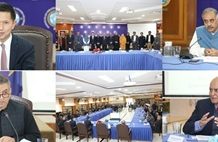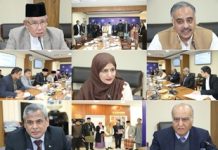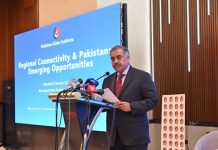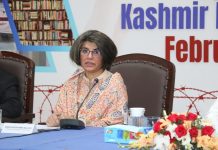Remarks by DG ISSI Ambassador Sohail Mahmood at the International Conference on “Navigating Pakistan’s Climate Action Path: Adaptation, Finance, and Technology”, 26 September 2024
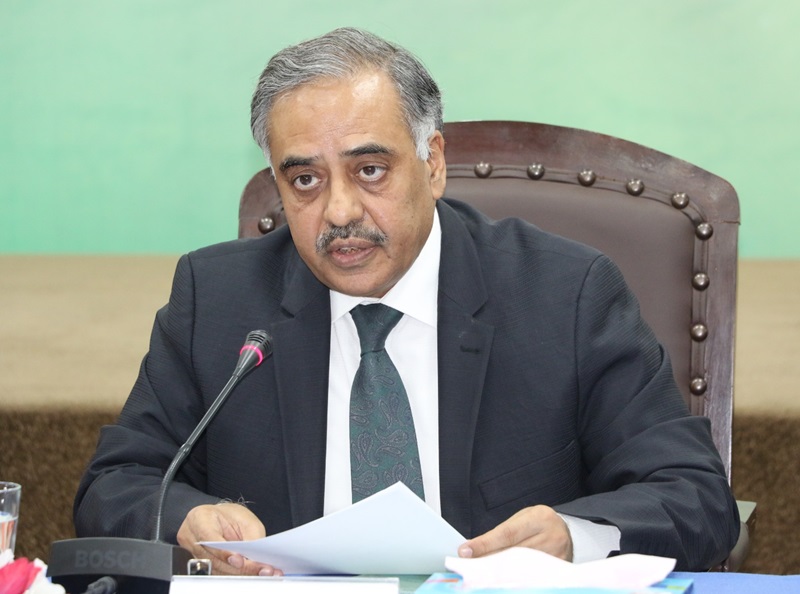
It is a distinct privilege and pleasure to welcome everyone to this International Conference on “Navigating Pakistan’s Climate Action Path: Adaptation, Finance, and Technology.” This is part of the series of events that the ISSI has been holding in the run-up to the Conference of the Parties (COP) summits in recent years.
We are delighted to partner with the Hanns Seidel Foundation (HSF) in organizing this event. The ISSI and HSF enjoy a long-standing collaborative relationship, which we are committed to further deepen. I thank Mr. Stefan Burkhardt for his participation from Berlin, where it is still very early morning. Our thanks also to Mr. Muhammad Bilal for close collaboration with CSP team.
We are thankful to the esteemed speakers from Pakistan and abroad as part of the various Panels, joining in-person and on-line. Their expertise and insights would enrich the conference’s deliberations. I take this opportunity to thank them individually and collectively. First and foremost, Ambassador Khazar Farhadov — whose great country Azerbaijan is set to host the next COP in Baku. Our thanks also to the other key stakeholders including the Ministry of Climate Change, the Ministry of Foreign Affairs, and Ms. Aisha Khan of CSCCC who has been a formidable campaigner from the civil society platform.
Last, but not the least, we are deeply honoured to welcome the Honourable Senator Sherry Rahman as Chief Guest. She is an acclaimed leader across a whole spectrum of domains. Her leadership on the environment and climate change issues is particularly recognized at the international level. Senator Sherry Rahman’s strong and relentless advocacy of Pakistan’s case and leading contribution to securing a global outcome regarding the establishment of Loss and Damage Fund are especially invaluable. As always we would all benefit enormously from her views and perspectives today.
Distinguished participants,
Pakistan, like many developing nations, remains on the frontlines of the climate crisis, facing increasing severity, frequency and scale of climate impacts. The 2022 catastrophic floods displaced millions and devastated critical infrastructure, serving as a stark reminder that climate change is not a distant threat but a present reality affecting lives, livelihoods, and our very future.
Pakistan’s vulnerability stems from myriad of factors. Geographically, it faces multiple climate-related risks: rising temperatures, glacial melt, erratic monsoons, droughts, and floods. Our river systems, crucial for agriculture and sustenance, are becoming more unpredictable. Coastal areas, especially in Sindh and Balochistan, are also at risk from rising sea-levels. These challenges are exacerbated by a growing population dependent on agriculture, which is particularly vulnerable to climate variability.
Despite contributing less than 1% to global greenhouse gas emissions, we endure disproportionate climate effects, raising urgent questions of equity and justice. This highlights the importance of platforms like UNFCCC Conference of Parties (COP) for advocating fairness and securing support for adaptation and mitigation efforts.
Pakistan’s Role in Global Climate Dialogues
For its part, Pakistan has been a key player in global climate discussions, notably chairing the G77 & China group at COP27 at Sharm el-Sheikh in November 2022. I have referred to Pakistan’s leadership role under Senator Sherry Rahman in achieving a major breakthrough on the creation of the Loss and Damage Fund. This was a significant achievement for climate-vulnerable nations. Pakistan also secured a seat on the Transition Committee to ensure transparent governance and the inclusion of the most affected countries in decision-making. However, the need for climate financing far exceeds what the Fund can currently provide.
Pakistan continues to push for greater financial commitments from developed nations to ensure that the Loss and Damage Fund is fully financed and operationalized, making a real impact on vulnerable countries facing the escalating costs of climate change.
At COP28 in Dubai, the first Global Stock Take (GST) under the Paris Agreement assessed global climate progress. Pakistan used the platform to highlight its need for tailored local adaptation strategies, emphasizing that adaptation must be specific to each country’s vulnerabilities. Pakistan called for enhanced capacity building and financial support to implement its National Adaptation Plans (NAPs), stressing that without sufficient funding, efforts remain in planning stages rather than becoming actionable projects.
COP29 and the Future of Climate Finance
As COP29 in Baku approaches — dubbed as the “Finance COP” — the government must prioritize securing adequate climate financing, which is imperative for implementing ambitious adaptation and mitigation strategies to protect our people and economy from future climate shocks and make them more resilient.
We should continue to advocate for effective functioning of the Loss and Damage Fund and push for increased financial commitments from the developed nations.
Furthermore, it is crucial to demand greater transparency and accountability in climate finance, as many commitments often fall short or are misallocated as development aid rather than new, additional funding.
Establishing a robust system for tracking and reporting climate finance will be vital to ensure that promised funds effectively reach the countries and communities most in need.
Pakistan is also committed to accelerating the transition to renewable energy, a critical component of climate action. However, this transition must ensure energy security and affordability. For many developing nations, the challenge is not just reducing emissions but also ensuring reliable, affordable energy access. A just and inclusive renewable energy transition is essential, considering the unique challenges faced by countries still grappling with energy poverty.
The just-concluded UN ‘Summit of the Future’ in New York did commit to strengthen global actions to address the climate change, but the ‘Pact for the Future’ did not go far enough in several respects. The need for tenacious advocacy and securing concrete outcomes for the specific needs of the developing countries within this crucial decade cannot be stressed enough.
Today’s conference is part of this broader dialogue. It brings together experts to delve deeper into Pakistan’s climate strategy, focusing on adaptation, finance, and technology. This collective effort is pivotal for further shaping Pakistan’s climate action path as we move toward COP29 and beyond.
Let me conclude by welcoming all the distinguished participants once again, and wishing Ambassador Farhadov and the Government and people of brotherly Azerbaijan a very successful COP29.
Thank you.




